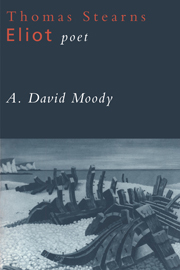Book contents
- Frontmatter
- Contents
- Acknowledgments
- Preface to second edition
- Introduction
- 1 The growth of the poet's mind
- PART ONE 1905–1912 – AN INDIVIDUAL TALENT
- Oxford University Extension Lectures
- PART TWO 1912–1922 – ‘SHALL I AT LEAST SET MY LANDS IN ORDER?’
- PART THREE 1922–1930 – ‘ORDINA QUEST’ AMORE, O TU CHE M' AMI'
- PART FOUR 1931–1939 – THE WORD IN THE DESERT
- PART FIVE 1939–1945 – APOCALYPSE
- AFTERWORDS
- APPENDICES
- A About the text of the poems
- B The drafts of The Waste Land
- C The Christian philosopher and politics between the wars
- D The secret history of Four Quartets
- E Artful voices: Eliot's dramatic verse
- Notes
- Index
C - The Christian philosopher and politics between the wars
Published online by Cambridge University Press: 05 February 2012
- Frontmatter
- Contents
- Acknowledgments
- Preface to second edition
- Introduction
- 1 The growth of the poet's mind
- PART ONE 1905–1912 – AN INDIVIDUAL TALENT
- Oxford University Extension Lectures
- PART TWO 1912–1922 – ‘SHALL I AT LEAST SET MY LANDS IN ORDER?’
- PART THREE 1922–1930 – ‘ORDINA QUEST’ AMORE, O TU CHE M' AMI'
- PART FOUR 1931–1939 – THE WORD IN THE DESERT
- PART FIVE 1939–1945 – APOCALYPSE
- AFTERWORDS
- APPENDICES
- A About the text of the poems
- B The drafts of The Waste Land
- C The Christian philosopher and politics between the wars
- D The secret history of Four Quartets
- E Artful voices: Eliot's dramatic verse
- Notes
- Index
Summary
I am no traitor, no enemy of the state …
The law of God is above the law of man,
The Kingdom of God above the kingdom of man.
(Thomas in Murder in the Cathedral)T. S. Eliot was not a political philosopher, and he had no political philosophy as such: he was a philosopher who took a certain interest in politics. Much confusion and misunderstanding has been generated by those interested in his politics who have failed to observe the distinction. What it means is that his thinking about politics is not simply dependent upon its object, and is not defined by its object – what is ordinarily called the subject-matter. Rather it is the expression of the point of view from which he examines the object; and his point of view is dependent upon and only defined by theology and revelation. He is, strictly speaking, a metaphysician, one who in observing politics is always trying to see through the actuality to the ideal. Consequently, if we really want to understand his remarks about politics – as distinct from engaging in political polemic, the purpose of which is rather more practical – we will need to penetrate beyond their relations to actual events and to rival political ideas, and to elicit their governing point of view, their metaphysic. The purpose of this note is simply to direct attention towards the philosophy of Eliot's politics.
- Type
- Chapter
- Information
- Thomas Stearns Eliot: Poet , pp. 319 - 326Publisher: Cambridge University PressPrint publication year: 1995



